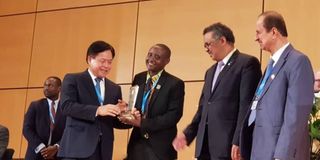TZ water safety invention wins global recognition

Dr Askwar Hilonga (middle) receives an award for innovation on water purification during the World Health Assembly on Friday in Geneva. On his left is WHO Director General Dr Tedros Adhanom Ghebreyesus. PHOTO | WHO
Dar es Salaam. A Tanzanian invention that could revolutionalise water safety treatment has won global accolades at the world health assembly in Geneva.
The invention is a water filter which absorbs anything from copper and fluoride to bacteria, viruses as well as pesticides and it uses nanotechnology (the branch of technology that deals with dimensions and tolerances of less than 100 nanometres) and sand to clean water.
The inventor, a Tanzanian chemical engineer, Dr Askwar Hilonga, also a senior lecturer at the Arusha-based Nelson Mandela African Institution of Science and Technology, was awarded the 2019 United Arab Emirates Health Foundation Prize.
Dr Hilonga was honoured at the 72nd World Health Assembly in Geneva, Switzerland for developing the project that is expected to expand access to safe water and reduce the risk of waterborne diseases in Tanzania and the African continent in general.
In Tanzania, many people, especially in remote rural areas, lack access to safe drinking water. Various studies have shown that all often, both surface water and groundwater sources are contaminated with toxic heavy metals, bacteria, viruses and other pollutants from mining, industrial effluent and poor sewage systems.
The scientist created filtration systems customized to specific regions in Africa and he is able to address the problem of heavy metals near Lake Victoria, while tackling the fluoride issue in the Rift Valley.
Motivated to alleviate water-borne diseases, Hilonga pursued his PhD in nanotechnology and went ahead to invent a nanofilter, a low-cost water purification system. Since then, he had won a variety of scientific competitions, which ultimately rewarded him fame as well as enough prize money to fund his own company, Gongali Model Company.
Dr Hilonga worked with the Ministry of Health, Community Development, Gender, Elderly and Children and the Ministry of Science and Technology to roll out his innovative water purification system in the country.
According to WHO, any water treatment device cannot be confirmed to efficiently protect populations from waterborne disease and to minimum health performance standards before it undergoes rigorous testing under a scheme to evaluate household water treatment technologies.
In that case, Dr Hilonga understands that rigorous testing is still needed, but he hopes this invention will help reduce waterborne diseases.
He is quoted on www.who.int as saying that the real challenge for any water-purification system is acceptance and regular use by the community. Many were initially suspicious about a technology developed by ‘one of theirs’.
But Dr Hilonga says he was able to convince local people to start using the filtration system because he understood the issues they faced.
He says women have been instrumental to introducing water filtration as part of daily life in rural Tanzania.
Most of the water stations where the new system is being tested are managed by women. “I would not have made it, if it were not for the local women who got on board and made it possible,” he explains.
His goal is to encourage water purification good practices across Tanzania and other African countries where rural populations suffer from waterborne diseases.
Dr Hilonga grew up in Gongali, a village near the Ngorongoro Crater. Like in most rural areas in Tanzania, families in Gongali would drink river water. As a result, Hilonga has struggled with waterborne diseases throughout his life.
He is one of five winners of the inaugural Johnson & Johnson Champions of Science—Africa Storytelling Challenge, which highlighted the journeys of scientists and innovators working in Africa and celebrated the profound difference their work is making in communities throughout the continent and around the world.
He hopes to create a filter that is easily transportable, convenient and esthetical to allow for greater expansion of the product throughout sub-Saharan Africa and other regions. Sources say already, he’s had requests for the Nanofilter from India, Ethiopia, Djibouti and Somalia.




